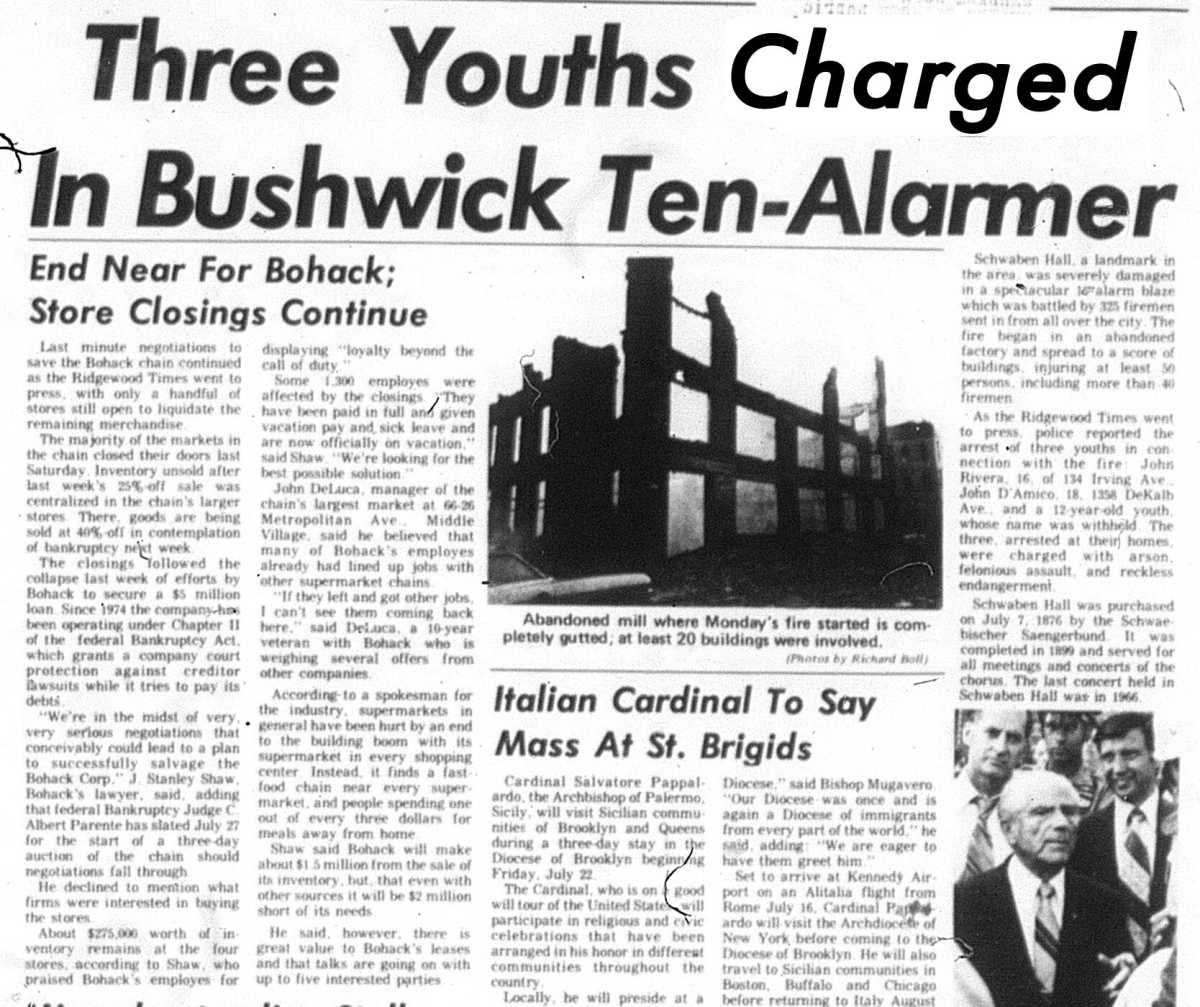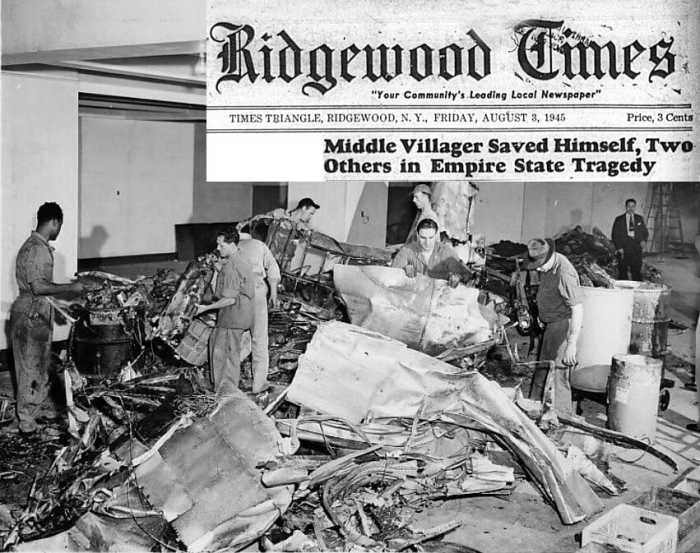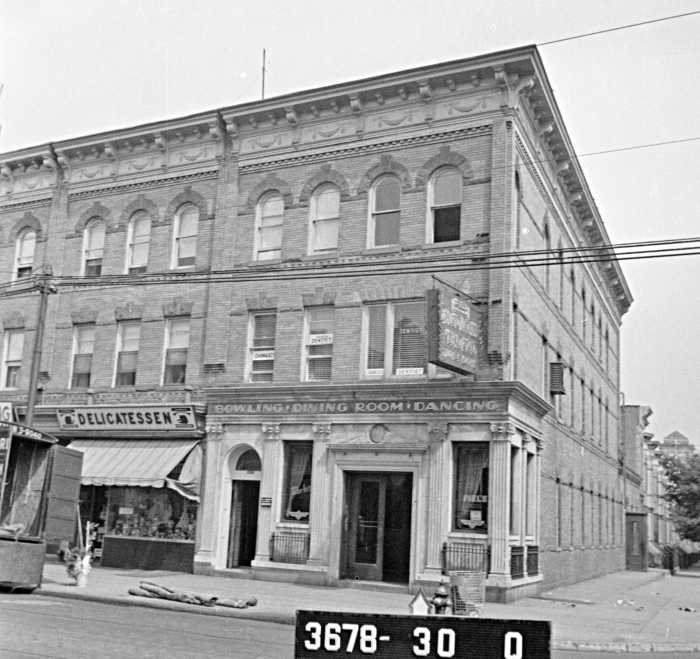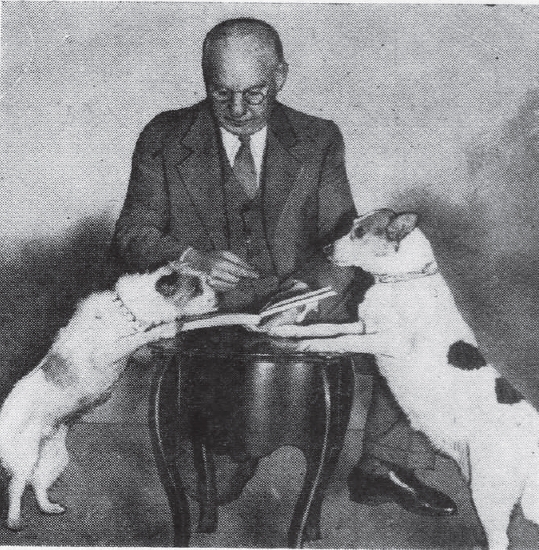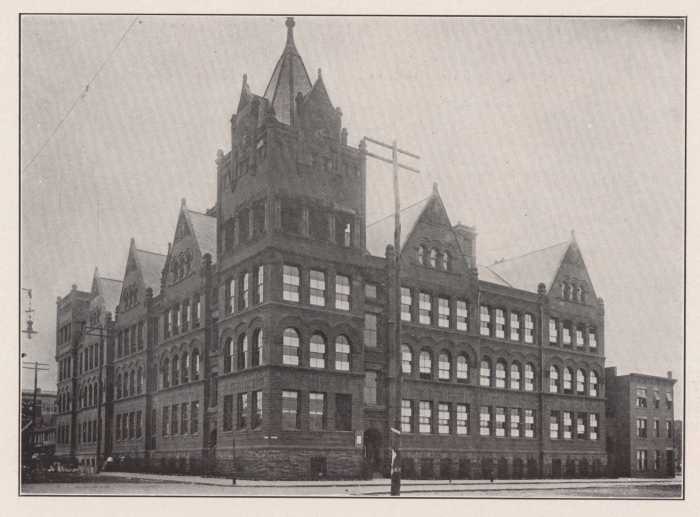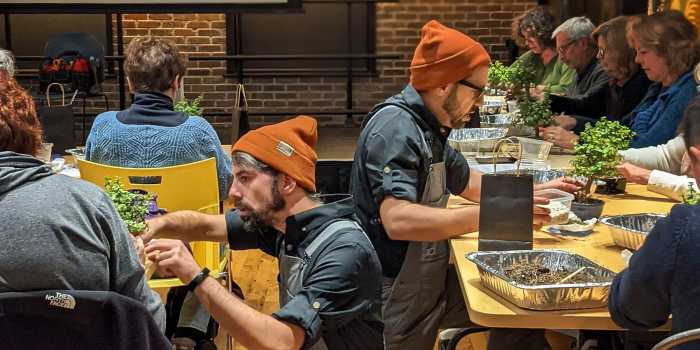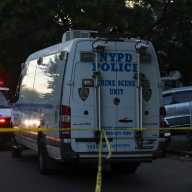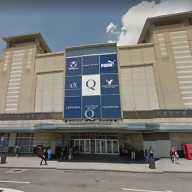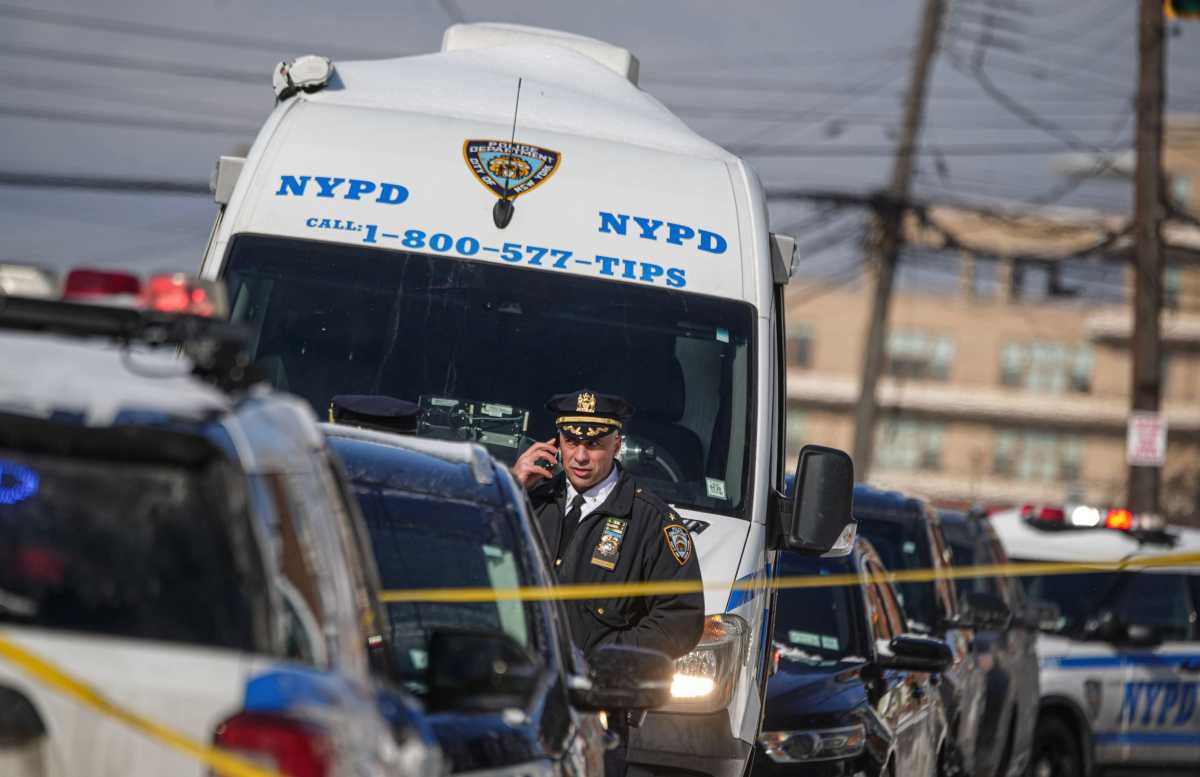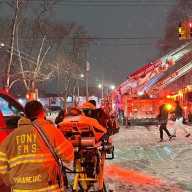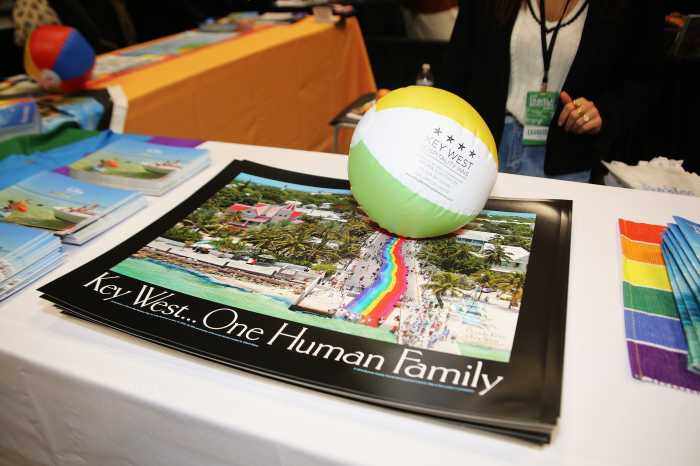The summer of 1977 proved to be one of the bleakest times in New York City’s history.
The Son of Sam serial killer terrorized residents. The city’s infrastructure crumbled before everyone’s eyes. City Hall found itself teetering on the edge of bankruptcy. A massive blackout that plunged the five boroughs into darkness on July 14, 1977, led to a looting and arson rampage that made many wonder if the city would self-destruct before the decade ended.
Indeed, urban decay during this period ravaged the Brooklyn neighborhood of Bushwick, Ridgewood’s next-door neighbor. The community suffered from acts of arson that destroyed block after block of multifamily apartment houses. In some cases, building owners had their properties burned down to collect on insurance money, as rents and real estate values diminished.
But in other instances, individuals (apparently with nothing better to do) would target long-abandoned structures and set them ablaze. That’s what happened on July 18, 1977, when youths allegedly set fire to an abandoned knitting mill at the corner of Knickerbocker Avenue and Bleecker Street — and the flames spread across seven full blocks of the community.
Firefighters called it the “all-hands fire,” a term typically used for a small, containable blaze. In reality, this “all-hands fire” was more literal; hundreds of firefighters from across Brooklyn and Queens — almost every available unit — were called to fight the massive inferno.
“While the rest of the city sweltered in 100-degree temperatures, the heat at the fire scene was so intense that it melted the glass windows of a firetruck and caused firemen to collapse from heat exhaustion,” the Ridgewood Times reported on its July 21, 1977, front page.
In the end, the Bushwick blaze injured 50 people, including 40 firefighters. Among the structures “severely damaged,” as the Ridgewood Times reported, was Schwaben Hall. The structure had been opened in 1899 by German immigrants “and served for all meetings and concerts” of the Schwaebischer Saengerbund Chorus.
“The last concert held in Schwaben Hall was in 1966,” the Ridgewood Times reported.
Three youths were charged with setting the blaze, as reported. One of the arrested suspects was just 12 years old. They were charged with arson, felonious assault and reckless endangerment.
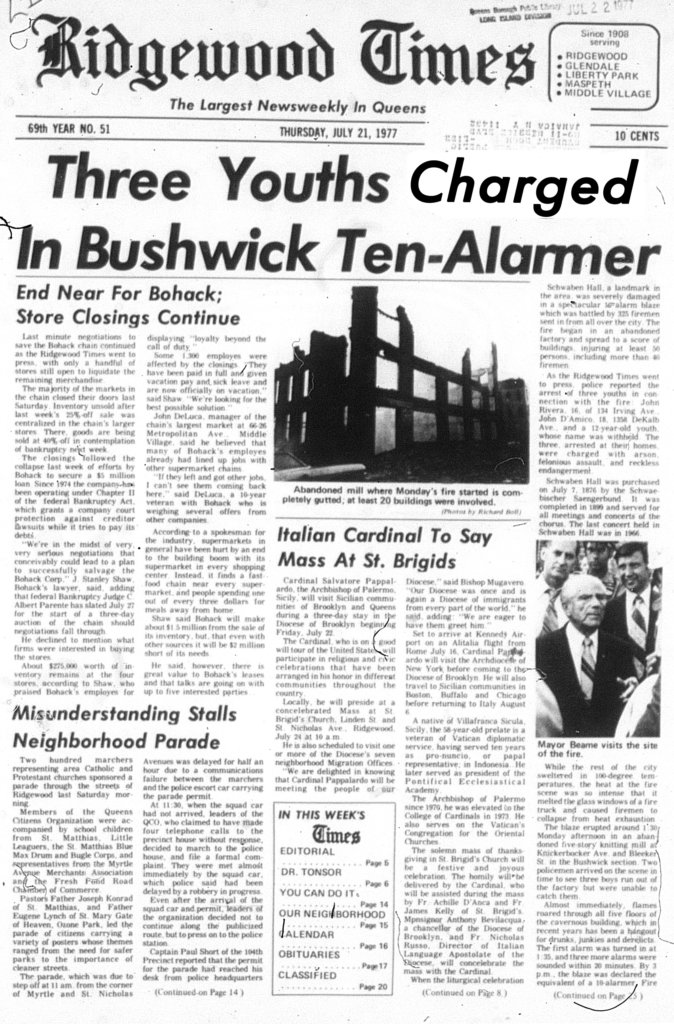
The Bushwick “all-hands fire” proved to be a turning point for the community, as it brought public attention to “the agony of Bushwick.” Mayor Abe Beame, then in the throes of a difficult re-election campaign, visited the fire site. His rivals in the Democratic primary that year — Mario Cuomo and Ed Koch, who would ultimately win the mayoral race — campaigned to bring about improvements in Bushwick and other blighted neighborhoods across the city.
Those improvements, to some observers, planted the seeds for the revival of Bushwick which would occur decades later.
While the “all-hands fire” dominated the headlines in the July 21, 1977, Ridgewood Times, there were, of course, other stories to be told.
The front page also featured a troubling story on the impending demise of the Bohack supermarket chain. Based in Ridgewood, Bohack had been one of the most successful grocery store chains in the city, but slowly faded into history during the 1970s.
“The majority of the markets in the chain closed their doors last Saturday [July 16],” the Times reported. “Inventory unsold after last week’s 25% off sale was centralized in the chain’s larger stores. There, goods are being sold at 40% off in contemplation of bankruptcy next week.”
Bohack had filed for Chapter 11 bankruptcy protection in 1974, but by the summer of 1977, needed a $5 million loan to survive — that never came.
“Some 1,300 employees were affected by the closings,” the Times reported. A supermarket industry spokesperson told the paper that “supermarkets in general have been hurt by an end to the building boom with its supermarket in every shopping center. Instead, it finds a fast-food chain near every supermarket, and people spending one out of every three dollars for meals away from home.”
Inside the July 21, 1977, Ridgewood Times, readers could find plenty of advertisers offering bargains on everything they need for their home. Dorter Rug Shop, at 56-52 Myrtle Ave. in Ridgewood, had a “super broadloom clearance sale” with broadloom items reduce to as low as $4.95 and up.
Montoro Shoes Inc., at 66-29 Fresh Pond Rd. in Ridgewood, offered men’s Bostonian and Verdi shoes and boots for $17.99 and $23.99, respectively. They also had their entire stock of spring and summer women’s shoes for $7.99 a pair.
Pellegrini’s restaurant, at 66-86 Fresh Pond Rd., advertised their “singles dance” open to adults 28 and over every Wednesday night from 8:30 p.m. to 1 a.m. For a $3 admission (before 9 p.m.), customers could enjoy a free drink and receive door prizes.
In the real estate section, one private home seller in Ridgewood listed a two-family home near Fresh Pond Road for just $44,000. Calbo Real Estate, at 55-32 Myrtle Ave. in Ridgewood, advertised several homes for sale and rent. One Middle Village bungalow went for just $48,500, and a four-family stone and brick apartment house in Ridgewood was on the market for $54,000. Rents for a four-room apartment in Glendale went for $175 a month, while a four-room Ridgewood apartment went for $150 a month.
* * *
If you have any remembrances or old photographs of “Our Neighborhood: The Way It Was” that you would like to share with our readers, please write to the Old Timer, c/o Ridgewood Times, 38-15 Bell Blvd., Bayside, NY 11361, or send an email to editorial@ridgewoodtimes.com. Any print photographs mailed to us will be carefully returned to you upon request.

